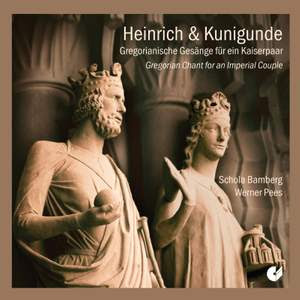Program: #20-30 Air Date: Jul 13, 2020
To listen to this show, you must first LOG IN. If you have already logged in, but you are still seeing this message, please SUBSCRIBE or UPGRADE your subscriber level today.
Chant for Emperor Heinrich and his wife Cunigonde, troubadour nights, and the live last collaboration between Jan Gabarek and the Hilliard Ensemble.
I. Heinrich & Kunigunde: Gregorian Chant for an Imperial Couple (Schola Bamberg/Werner Pees). Christophorus CD CHE 0215-2.

CD1 [76:49]
(Dom zu Mainz, 7. Juni 1002)
2 Responsorium zum Einzug 3:43
3 Befragung von König und Volk 2:07
4 Salbung 3:00
5 Responsorium nach der Krönung 2:37
6 Hymnus In Adventu Regis 2:29
7 Te Deum laudamus 7:40
Krönungsmesse · Coronation Mass
8 Introitus Factus est 2:42
9 Kyrie Fons bonitatis mit Tropus 7:49
10 Gloria 3:30
11 Laudes Regiæ 10:43
12 Lectio scripturæ 1:36
13 Resp. Graduale Ad Dominum 3:47
14 Alleluja Domine Deus meus 3:02
15 Lectio Evangelii 2:07
16 Credo VI 7:08
17 Offertorium Domine convertere 4:25
18 Sanctus 1:24
19 Agnus Dei 1:46
20 Communio Cantabo Domini 2:48
21 Oratio ad complendum 1:28
Nova Historia Kunegundis (1288)
Gesänge zum Fest der Hl. Kunigunde
1 Kunigundenglocke 0:33
Ad vespera
2 Incipit 0:58
3 Antiphona I & Psalmus 109 2:12
4 Antiphona II & Psalmus 112 1:53
5 Antiphona III & Psalmus 121 2:04
6 Antiphona IV & Psalmus 126 2:02
7 Antiphona V & Psalmus 147 1:50
8 Capitulum 0:40
9 Responsorium 2:59
10 Hymnus 2:20
11 Versiculum 0:26
12 Antiphona & Magnificat 5:15
13 Oratio 1:05
14 Versiculum 0:46
Ad primam nocturnam
15 Invitatorium 0:39
16 Antiphona I & Psalmus 8 2:06
17 Antiphona II & Psalmus 18 2:09
18 Antiphona III & Psalmus 23 2:09
19 Lectio I & Responsorium 2:56
20 Lectio II & Responsorium 3:14
21 Lectio III & Responsorium 3:52
Ad secundam nocturnam
22 Antiphona I & Psalmus 44 2:14
23 Antiphona II & Psalmus 45 1:33
24 Antiphona III & Psalmus 86 2:21
25 Lectio I & Responsorium 2:54
26 Lectio II & Responsorium 3:39
27 Lectio III & Responsorium 4:27
28 Kunigundenglocke 2:05
II. Nuits Occitanes (Céladon/Paulin Bündgen). Ricercar CD RIC 144.

The music of the troubadours is the subject of many questions, the first of which concerns the importance of music in the troubadour tradition, given that this tradition was both the mirror of a society as well as one of its most refined poetical expressions. What remains from almost two centuries of troubadour art is limited to a few manuscripts which contain approximately 2,500 poems (only 350 had been assigned melodies).
Nuits Occitanes is devoted to songs about love and the usually vain research for it. This is always at the primary level of physical love, except for the less frequent songs in which the lovers are reunited, only to be separated again at daybreak. This programme, based on the theme of night, transports us into a world of courtly chilvary that despite its savagery and wildness also knew moments of extreme refinement. As musicians, the Céladon Ensemble’s greatest concern was to reflect the emotions that they had experienced when they first read these troubadour’s songs and poems. Real men and women of flesh and blood are described. Their underlying and almost palpable presence makes this music even more alive and moving.
Before nightfall
-
- Marcabru: Lo vers comens
- Raimon Jordan: Lo clar temps vei brunezir
- Bertran de Born: Rassa tan creis
During the night
-
- Beatriz de Dia: A chantar m'er
- Cadenet: S'anc fui bela ni prezada
After the night
- Guirault de Bornelh: Reis glorios
- Bernat de Ventadorn: Can l'erba fresch'
- Raimon de Miraval: Cel que no volh auzir chanssos
- Berenguier de Palazol: Tan m'abelis
III. Remember Me, my dear (The Hilliard Ensemble, Jan Gabarek, saxophone). ECM CD 2625.

Garbarek, David James (countertenor), Rogers Covey-Crump (tenor), Steven Harrold (tenor), and Gordon Jones (baritone) worked together on 1994’s stately, experimental Officium and 2010’s Officium Novum. Like Remember me, my dear, those albums’ radical dissections of early classical music and its contemporary cousin resonated with holy harmonies, allowing both saxophonist and singers to soar as one sheet of sound, though acting separately from the other. The throes of the past were the focus—primitive-sounding chants and deep, aged rolling r’s, with Garbarek’s reeds offering up plaintive wails and playful howls—but there was, too, a distant sense of the now. If the Art Ensemble of Chicago hadn’t already taken the “ancient to the future” slogan, Garbarek & Co. could have.
Recorded during their final tour together in 2014 at the Chiesa della Collegiata dei Santi Pietro e Stefano in Bellinzona, in the Ticino canton of Switzerland—shortly before the Hilliards disbanded permanently—Remember me, my dear isn’t radically different from their previous work. But the monastery atmosphere that gave their studio work a dank chill is warmed here.
They open gently with Garbarek’s ever-so-slightly distorted soprano sax and lead into the vocal wind of prayer that is “Ov zarmanali,” then turn the equation sideways on the moodily medieval “Procurans odium.” Here, the saxophonist toys with the subdued breathiness of the Hilliards’ lead in a manner that’s less hymnal yet no less majestic. The quietly energized invocation that is “Agnus dei” becomes what Brian Wilson called his own Pet Sounds album, a symphony to God that also soliloquizes the joy of collaborative music itself.
Composer Info
Jan Garbarek, Nikolai N. Kedrov, Arvo Pärt, Guillaume le Rouge, Pérotin, Hildegard von Bingen, Antoine Brumel
CD Info
Christophorus CD CHE 0215-2, Ricercar CD RIC 144, ECM CD 2625
